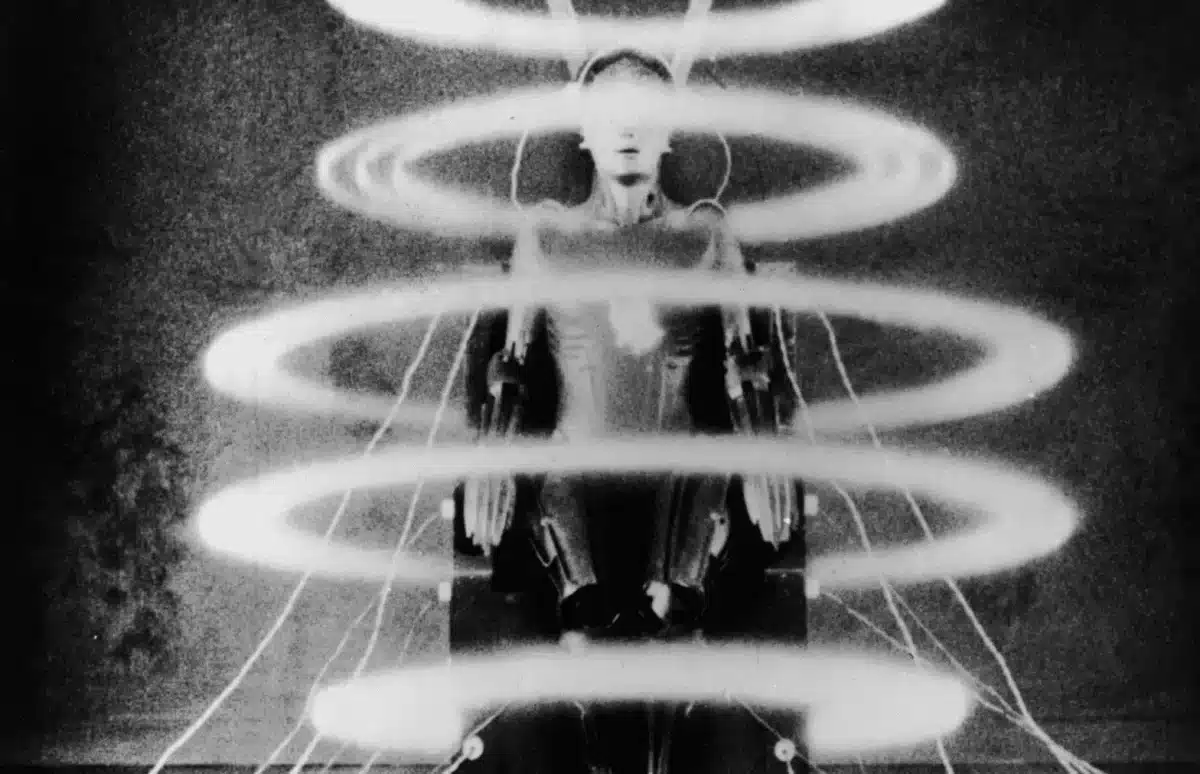
On a Sunday morning, I decided to watch the 1927 German silent film, Metropolis, under the recommendation of a self-proclaimed ‘cinephile’ whom I met the night before. Although I wouldn’t usually take film suggestions from someone wearing a scarf indoors, his sentiments that the film’s themes were “totally ahead of it’s time” was shared by a far more cultured friend; and now after spending two and a half hours watching it on my laptop in bed, I completely agree.
Directed by Fritz Lang, the father of science fiction film, Metropolis is set in the dystopian future of 2000, where hyper-capitalism has taken over society, perpetuating a brutal class divide. The film opens by displaying the two contrasting locations of ‘The City of Workers’ and ‘Club of the Sons.’ ‘The City of Workers’ located in the ‘depths below’ is the dystopian home of the masses, who live in homogony, constantly forced into torturous mechanical labour, wearing uniformed black clothing, with their heads down and even their footsteps moving in sequence. In opposition the ‘Club of the Sons’ is depicted as an almost utopian landscape, where the children of rich industrialists live a life of hedonism, filled with libraries, theatres and stadiums, reminiscent of the indulgency of the roaring 20s.
Metropolis predictions of a divided dystopian society, are more accurate than most would like to admit. Since its release it has inspired countless science fiction films, including Blade Runner and several of the Batman movies and its design has been replicated by directors such as Stanley Kubrick, Steven Spielberg and George Lucas. In 1984, performer and songwriter Giorgio Moroder, restored the film, to make it more palatable to a mainstream 1980’s audience, shortening the run time and adding coloured hews to the previously black and white frames. Changing the soundtrack to pop-rock music by Freddie Mercury, Adam Ant and Bonnie Tyler, Mororder illustrated that the film’s themes, even transcends a drastic change of style.
Fritz Lang has stated that Metropolis was born in 1924, from his first sight of New York City, the centre of Western capitalism. He describes how the bright lights and luxurious backdrops distracts from the “crucible of the multiple and confused human forces,” who have an “irresistible desire to exploit one another, thus living in perpetual anxiety.” His belief that the city was almost composed of illusions inspired him to create a film to depict such an industrial future. Lang also drew from the cities architecture to help build the expressionist world of Metropolis, taking heaving inspiration from New York’s Art Deco skyscrapers.
The first act of the film follows the journey of the protagonist, Freder, the son of the master of Metropolis, Joh Fredersen. Freder, lives a life of ignorance, spending most of his time, with other oblivious children of the wealthy, frolicking in pleasure gardens, playing sports and attending parties. However, Maria, unexpectedly appears at the ‘Club of the Sons’, accompanied by a plethora of disadvantage yet adorable children, Freder is captivated by her. Seeking Maria out in the underground of Metroplis, Freder discovers the secret of the city, witnessing how the masses work in agony to serve the machine. After watching an accident which kills many workers, he rushes to tell his father of the disaster, but Freder’s concerns about the incident and the city’s conception are dismissed.
The first act of Metropolis, with its heavy themes of class divide, appears to be a socialist critique of industrial capitalism, one that was rapidly expanding, following the First World War. Made during the height of the Weimar Republic, the film appeared sympathetic to the Frankfurt School, a prevalent model of social theory based in Marxism, which critiqued the current socio-economic systems. Therefore, upon its release many criticised the film, accusing Lang of spreading communist rhetoric. However, when watching the final two acts, as the film becomes more grounded in science fiction, the themes start to shift. Although on the surface level, Metropolis is a political critique, the film at its core is also deeply religious.
In order to stop his son’s action, Fredersen, seeks the help of an inventor and mad scientist, Rotwang, who succeeded in creating a robot, called ‘Hel’, as a resurrection of the women he loved. The film then cuts to Freder, who eventually finds the mysterious women Maria, and along with all the other workers is mesmerised by her words. Maria, depicted as a saint, preaches to the masses in front of wooden crosses, that one day a ‘mediator’ will come to save them from there brutal work. After Fredersen, realises Maria’s influence over the City of Workers, he commands Rotwang to make the robot ‘Hel’ take on her appearance.
Although today Metropolis is widely celebrated, and can be described as one of the great films of the silent era, upon release, it received mixed reviews. H.G. Wells proclaimed it as “the silliest film” that “gives in one eddying concentration almost every possible foolishness, cliché, platitude, and muddlement about mechanical progress and progress in general served.”
Metropolis’s religious themes and messiah allegory were common for high budget films during the silent era, as studios had to appeal to mainstream audiences, however, it’s the film’s progressive politics that have drawn in viewers decades later. Although its religious undertones create a universal message of morality, Lang’s depiction of a hyper-capitalist dystopia has never failed to feel contemporary, thus solidifying Metropolis as a masterpiece of its age.



